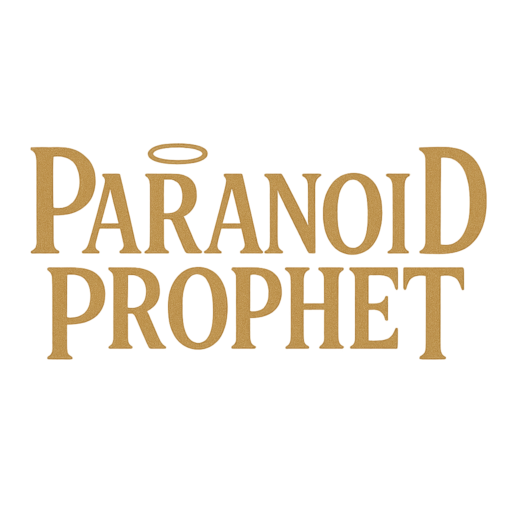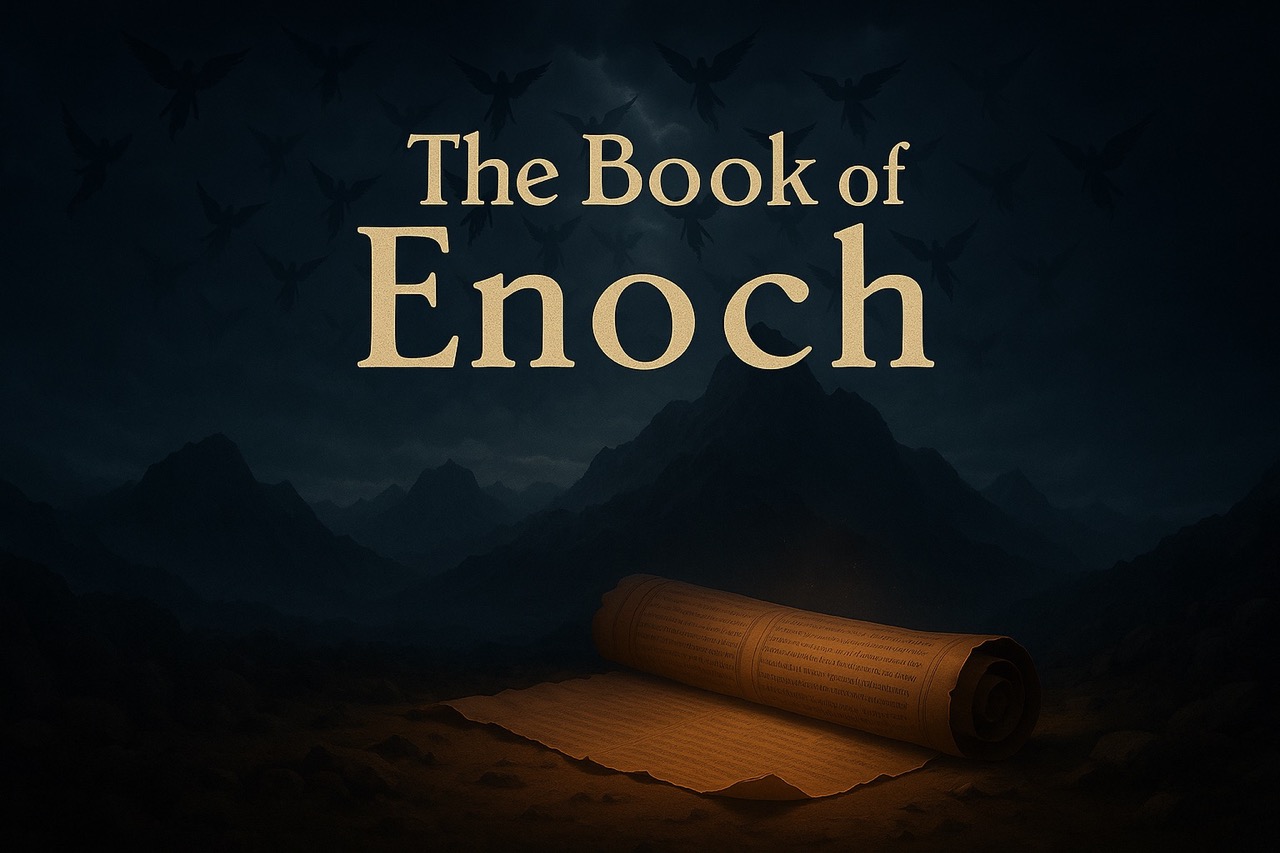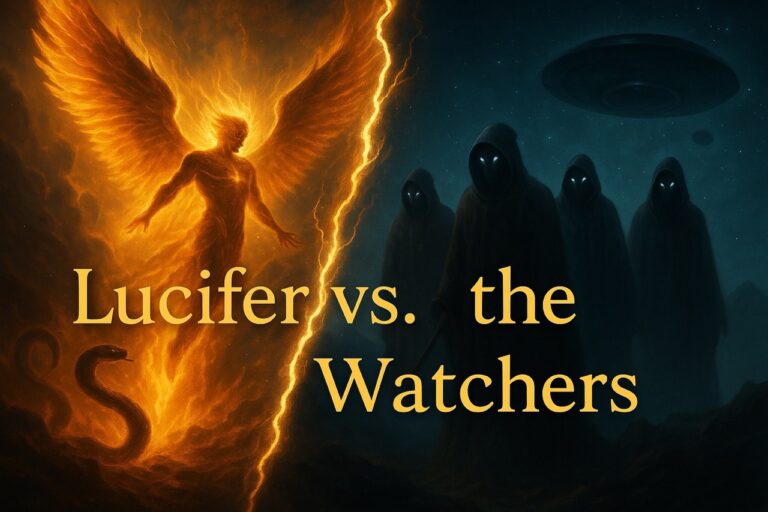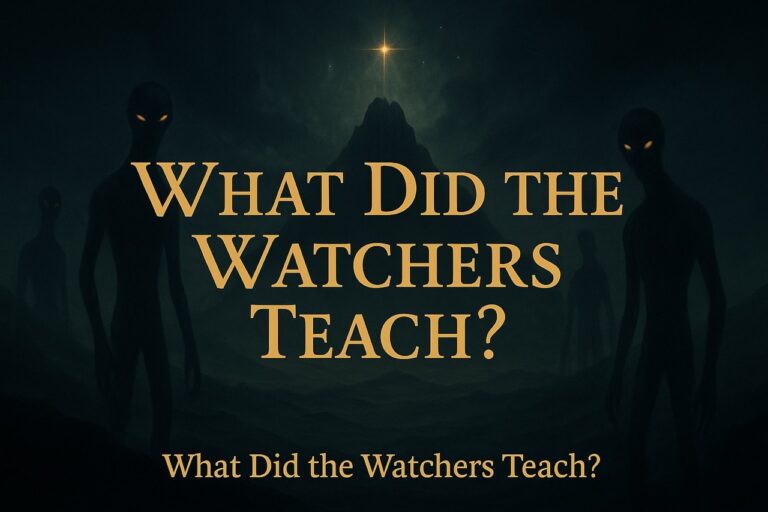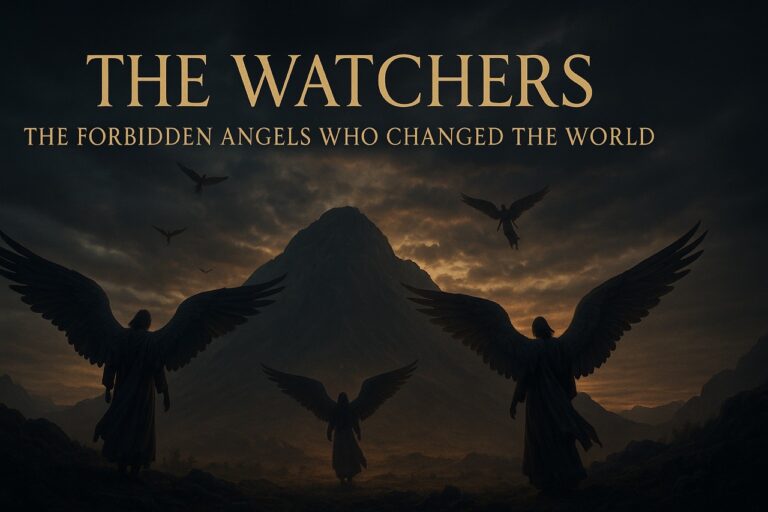The Book of Enoch is one of the most controversial ancient texts ever written. Claimed to be authored by Enoch, the great-grandfather of Noah, this non-canonical book offers a dramatic expansion of the Genesis 6 story — detailing how 200 heavenly beings known as the Watchers descended to earth, corrupted creation, and taught forbidden knowledge to mankind. But why was this book removed or never included in most Bibles? And why does it still fascinate theologians, historians, and prophecy watchers today? In this article, we explore the Book of Enoch’s content, history, theology, and possible end-times implications.
They descended from the heavens… They taught forbidden things… They took human wives… And gave birth to giants.
But one man saw the truth. He walked with God… and was no more.
This is the Book of Enoch.
A text cast out. A vision of judgment. A mystery that won’t stay buried.
📖 What Is the Book of Enoch?
The Book of Enoch — also known as 1 Enoch — is an ancient Jewish apocalyptic text attributed to Enoch, the seventh generation from Adam (see Genesis 5:18–24). Though not included in the canonical Bible used by most Jews or Christians, it holds a unique place in religious history, especially in Second Temple Judaism and early Christian thought. The Ethiopian Orthodox Church remains the only major Christian body to include it in its official canon.
Scholars consider it a pseudepigraphal work, meaning it was written under Enoch’s name to preserve sacred teachings passed down through oral tradition. Despite its exclusion from the Bible, the Book of Enoch was highly influential among early Church fathers, Qumran communities, and apocalyptic writers.
🧩 Structure of the Book of Enoch
The full text of 1 Enoch is composed of five major sections, each delivering unique spiritual insights and prophetic visions:
- The Book of the Watchers (Chapters 1–36)
Tells of the 200 angels (Watchers) who descended to earth, took human wives, fathered the Nephilim (giants), and were judged by God. - The Book of Parables / Similitudes (Chapters 37–71)
Features vivid messianic prophecies and introduces the powerful figure of the “Son of Man” — language later echoed in the Gospels. - The Astronomical Book (Chapters 72–82)
Describes an intricate calendar system, sun and moon cycles, and the laws governing the heavens — possibly to counter pagan astrology. - The Book of Dream Visions (Chapters 83–90)
Offers symbolic dreams outlining the spiritual history of Israel, the Flood, and a coming day of judgment. - The Epistle of Enoch (Chapters 91–108)
A moral and eschatological warning to future generations about wickedness, final judgment, and the reward of the righteous.
Together, these five sections paint a cosmic narrative: a world corrupted by divine rebellion, a heaven preparing for final judgment, and a prophetic voice crying out from the Days of Noah — one that still echoes in biblical prophecy and modern end-times discussions.
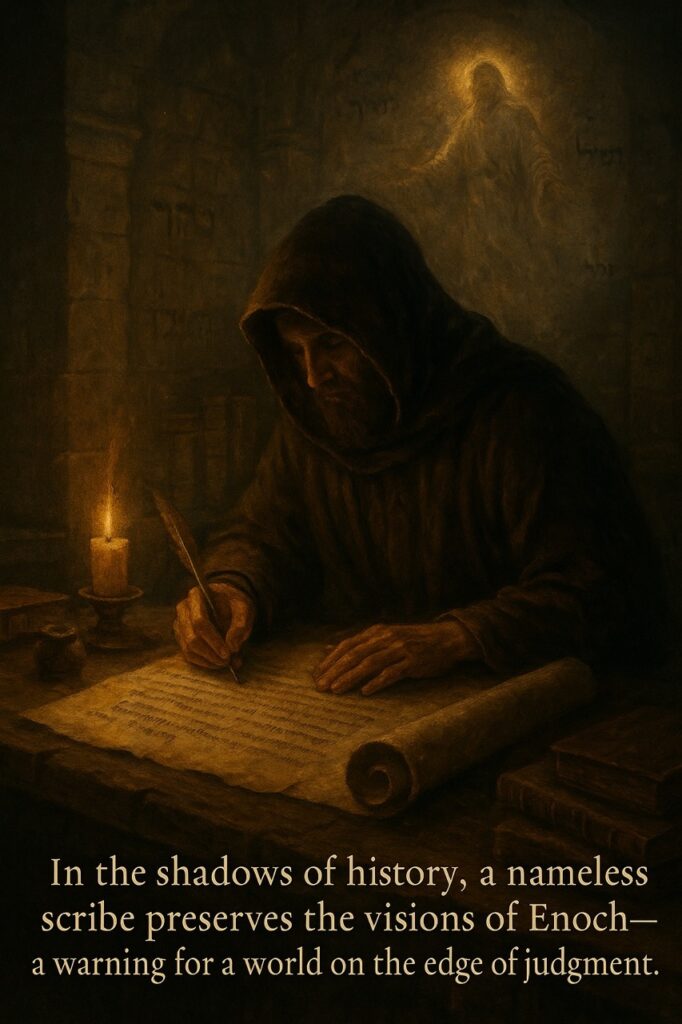
Who Wrote the Book of Enoch?
The Book of Enoch claims to be written by Enoch — the seventh from Adam — the man who “walked with God, and was no more” (Genesis 5:24). While this gives the book ancient authority, most biblical scholars agree it was not written by Enoch himself. Instead, it is a pseudepigraphal text — meaning it was written by later authors who attributed it to Enoch to preserve and elevate its message.
Scholars believe the Book of Enoch was composed in several stages by multiple Jewish writers between 300 BC and 100 AD, likely during the Second Temple period. It draws from much older oral traditions that revered Enoch as a righteous prophet and visionary who received knowledge directly from heaven.
The book’s layered structure — including apocalyptic visions, celestial calendars, and moral teachings — suggests it was compiled over time and influenced by a wide range of Jewish sects, including the Essenes, who likely viewed Enoch as a key to understanding divine judgment and spiritual warfare.
Despite its exclusion from most modern Bibles, the Book of Enoch was:
- ✅ Preserved in Aramaic among the Dead Sea Scrolls, proving its use in pre-Christian Jewish communities
- ✍️ Quoted or referenced by Church fathers such as Tertullian, Irenaeus, Justin Martyr, and Origen
- 🔥 Highly influential in shaping early Jewish apocalyptic literature and Christian eschatology, including concepts of fallen angels, resurrection, and final judgment
In short: the Book of Enoch may not be part of canon, but it undeniably shaped the worldview of both ancient Jews and early Christians — including the authors of the New Testament.
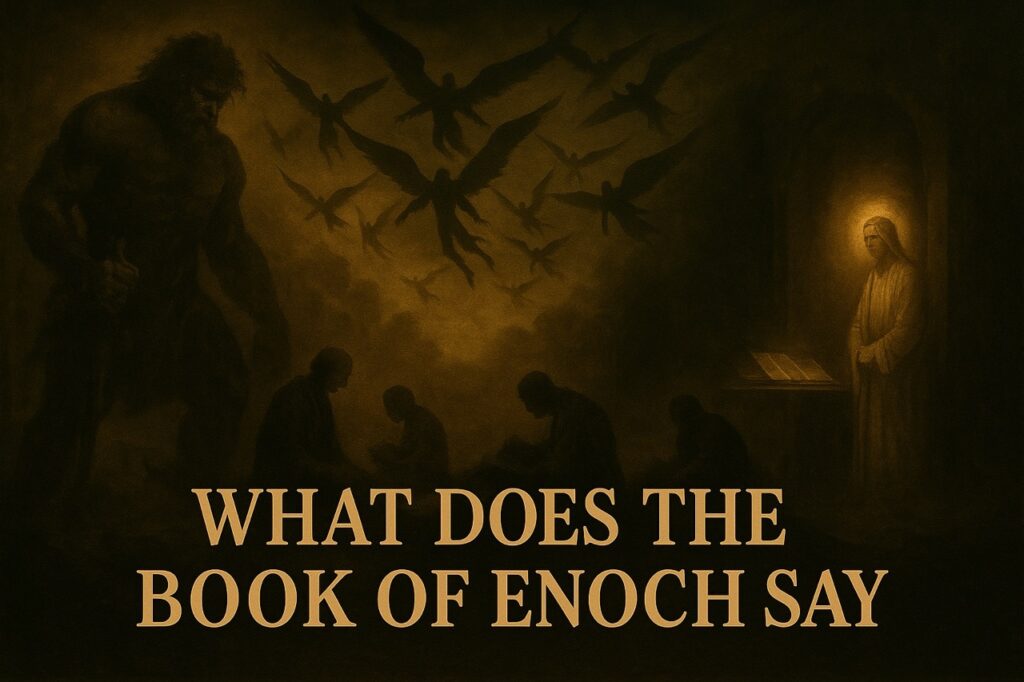
🖋️ Who Wrote the Book of Enoch?
The Book of Enoch presents itself as authored by Enoch, the seventh generation from Adam — the man who “walked with God, and was no more” (Genesis 5:24). This attribution gave the book profound spiritual authority in ancient times. However, most modern scholars agree it was not directly written by Enoch himself, but is instead a pseudepigraphal text — a work written under the name of a revered figure to preserve sacred oral teachings.
📜 When Was the Book of Enoch Written?
Scholars believe the text was composed in multiple stages between 300 BC and 100 AD, likely during the Second Temple period — a time rich in Jewish apocalyptic thought. The book likely draws from even older oral traditions that regarded Enoch as a prophetic visionary who was granted access to heavenly mysteries.
Its content reflects a layered structure — including visions, celestial calendars, and moral exhortations — indicating contributions from various authors across centuries. Key influences likely include the Essenes, the ascetic Jewish sect that preserved Enochic writings among the Dead Sea Scrolls at Qumran.
🧩 Key Evidence of Its Influence
Despite being excluded from the Jewish and most Christian biblical canons, the Book of Enoch was highly respected in ancient times and had lasting influence on biblical theology:
🔥 Shaped New Testament concepts like fallen angels, resurrection, and final judgment — especially in Jude, 2 Peter, and Revelation
✅ Preserved in Aramaic fragments among the Dead Sea Scrolls, proving its pre-Christian usage in Jewish apocalyptic circles
✍️ Quoted and referenced by early Church fathers such as Tertullian, Irenaeus, Justin Martyr, and Origen

❌ Why Isn’t the Book of Enoch in the Bible?
Although the Book of Enoch is directly quoted in the New Testament — specifically in Jude 1:14–15, which references a prophecy from Enoch himself — the book was ultimately excluded from the biblical canon. The reasons are complex and rooted in questions of authenticity, authority, and theological alignment.
📚 1. Uncertain Authorship
The book claims to be written by Enoch, the seventh generation from Adam — but Enoch lived before the Flood, long before written language was developed. Because of this, early Jewish and Christian scholars regarded the attribution as symbolic rather than literal, classifying it as pseudepigraphal (falsely attributed). This cast doubt on its legitimacy as divinely inspired Scripture.
🔗 2. Lack of Apostolic Connection
Unlike the canonical books of the New Testament — which were either written by apostles or closely associated with them — the Book of Enoch has no apostolic authorship or endorsement. As the early Church solidified the canon, apostolic origin was a key criterion for inclusion, especially in Western Christianity.
☁️ 3. Theological Concerns
The Book of Enoch contains extensive teachings on angels, demons, heavenly realms, and cosmic calendars — much of which goes beyond or outside the scope of biblical doctrine. Church leaders feared that its elaborate angelology and speculative cosmology could distract from the Christ-centered message of the gospel and open the door to mystical or Gnostic interpretations.
⛪ 4. Limited Liturgical Use
While the Book of Enoch was widely read among certain Jewish sects (such as the Essenes) and cited by early Church fathers, it was not universally accepted or read in the majority of Christian churches. Over time, books that were not regularly read in public worship or considered doctrinally stable were gradually excluded from official canon lists.
🇪🇹 5. One Exception: The Ethiopian Canon
The Ethiopian Orthodox Tewahedo Church remains the only major Christian tradition that has canonized the Book of Enoch, preserving it in the ancient Ge’ez language for over 1,600 years. Its inclusion reflects the influence of early Jewish-Christian traditions in that region — possibly preserved by communities fleeing Roman rule after the destruction of Jerusalem.
💡 In Summary:
The Book of Enoch wasn’t “banned” — it was weighed, debated, and ultimately set aside during the long process of canon formation. While not part of most Bibles today, its early influence and prophetic themes continue to spark serious interest among Bible scholars, prophecy researchers, and end-times watchers.
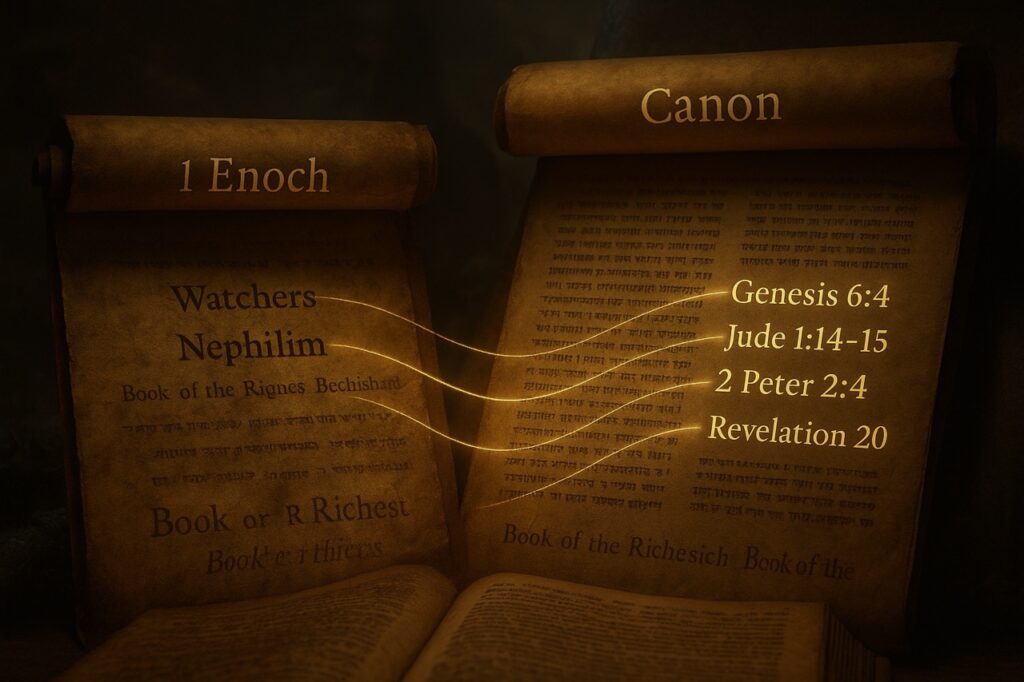
🔁 Biblical Parallels & References
Although the Book of Enoch is not part of the standard biblical canon, its themes, language, and imagery appear to have profoundly influenced several key passages in the Old and New Testaments. These parallels suggest that Enochic tradition was widely known and respected during the Second Temple period and among the authors of the New Testament.
📖 Key Biblical Echoes of the Book of Enoch
🧬 Genesis 6:1–4
“The sons of God saw that the daughters of man were attractive, and they took as their wives any they chose…”
This mysterious passage closely parallels 1 Enoch 6–7, where 200 Watchers (fallen angels) descend to earth, take human wives, and produce the Nephilim — giants who bring violence and corruption.
🕊️ Jude 1:14–15
“Behold, the Lord comes with ten thousands of His holy ones, to execute judgment…”
This is a direct quote from 1 Enoch 1:9, making Jude the only New Testament writer to cite Enoch by name. It affirms Enochic tradition’s authority in some early Christian circles.
🔗 2 Peter 2:4
“God did not spare angels when they sinned, but cast them into hell and committed them to chains of gloomy darkness…”
This language mirrors Enoch’s account of the Watchers — angelic beings who are judged and bound in Tartarus for their rebellion, awaiting final judgment.
🔥 Revelation 20:11–15
“And the dead were judged by what was written in the books…”
The vision of final judgment, a cosmic abyss, and books of record parallels Enoch’s apocalyptic visions, where the righteous and wicked are separated based on divine books and heavenly testimony.
🧠 Why It Matters
These connections reveal that the Book of Enoch was widely read and theologically influential in the centuries leading up to and during the formation of the New Testament. Even though it was later excluded from the canon, its ideas helped shape the biblical understanding of angels, judgment, and the end times.
In short: the fingerprints of Enoch can be found throughout Scripture — even if his name is hidden.
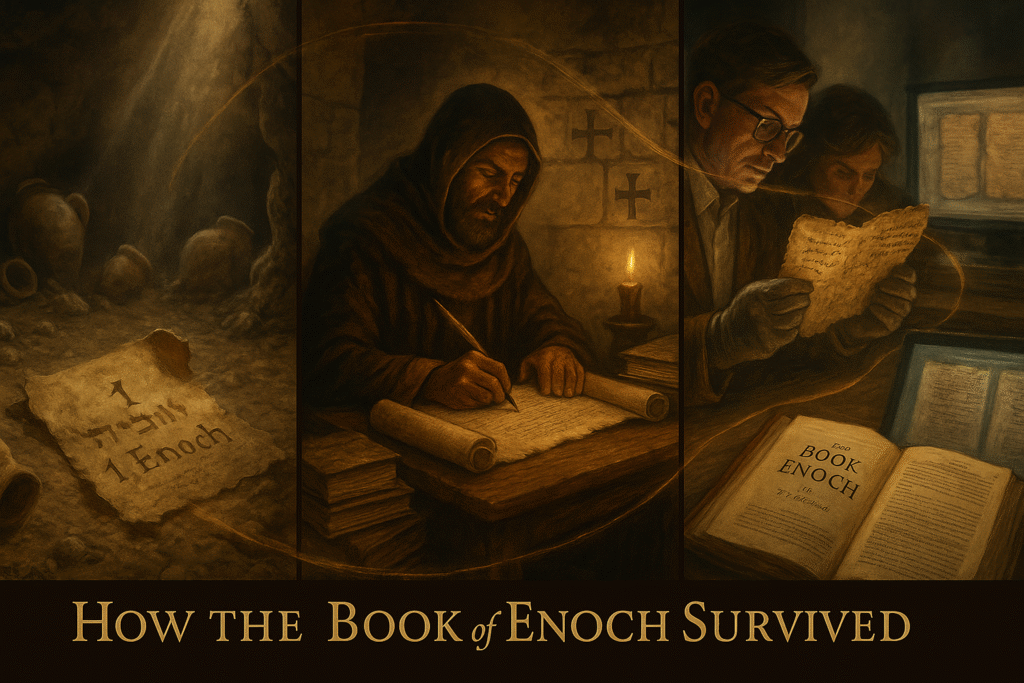
🏺 Historical Sources & Preservation of the Book of Enoch
Though the Book of Enoch was lost to most of the Western Church for over a millennium, it was never fully forgotten. Across three continents and several languages, this ancient text was preserved by those who considered it spiritually important — even sacred. Its survival reveals how influential it was to Jewish apocalyptic tradition, early Christian writers, and Orthodox Christian communities.
🗃️ 1. Dead Sea Scrolls – Qumran, Israel (2nd Century BC)
Multiple Aramaic fragments of 1 Enoch were discovered among the Dead Sea Scrolls at Qumran — proving that it was copied, read, and valued by the Essenes, a radical Jewish sect active during the Second Temple period. These scrolls date from 200–100 BC, well before the New Testament was written.
✅ This confirms that the Book of Enoch was part of the apocalyptic literature shaping pre-Christian Jewish thought.
📚 2. Early Church Fathers – 2nd to 4th Century AD
Notable Christian theologians such as Tertullian, Irenaeus, Origen, and Justin Martyr frequently quoted or referenced the Book of Enoch in their writings. Some defended its use, especially regarding:
- The fall of the angels
- The origins of evil
- End-times judgment
- The nature of the “Son of Man”
Though eventually excluded from the canon, these citations prove the text was taken seriously by the early Church — especially in doctrinal debates around angelology and eschatology.
🇪🇹 3. The Ethiopian Orthodox Church – Ge’ez Canon
The only Christian tradition to fully canonize the Book of Enoch is the Ethiopian Orthodox Tewahedo Church, where it has been preserved in the ancient Ge’ez language for over 1,600 years. It remains part of their official Bible and is read alongside books like Genesis, Isaiah, and the Gospels.
📖 This makes Ethiopia the only living link to an unbroken tradition of Enochic scripture.
🌍 Multilingual Preservation
The Book of Enoch has survived in three major languages:
- Aramaic – in the Dead Sea Scrolls (fragments)
- Greek – in early Christian translations (partially lost)
- Ge’ez – the only complete version, preserved in Ethiopia
Despite exclusion from the Western canon, the Book of Enoch endured through reverence, copying, and divine preservation — becoming a bridge between ancient Jewish cosmology and Christian prophetic imagination.
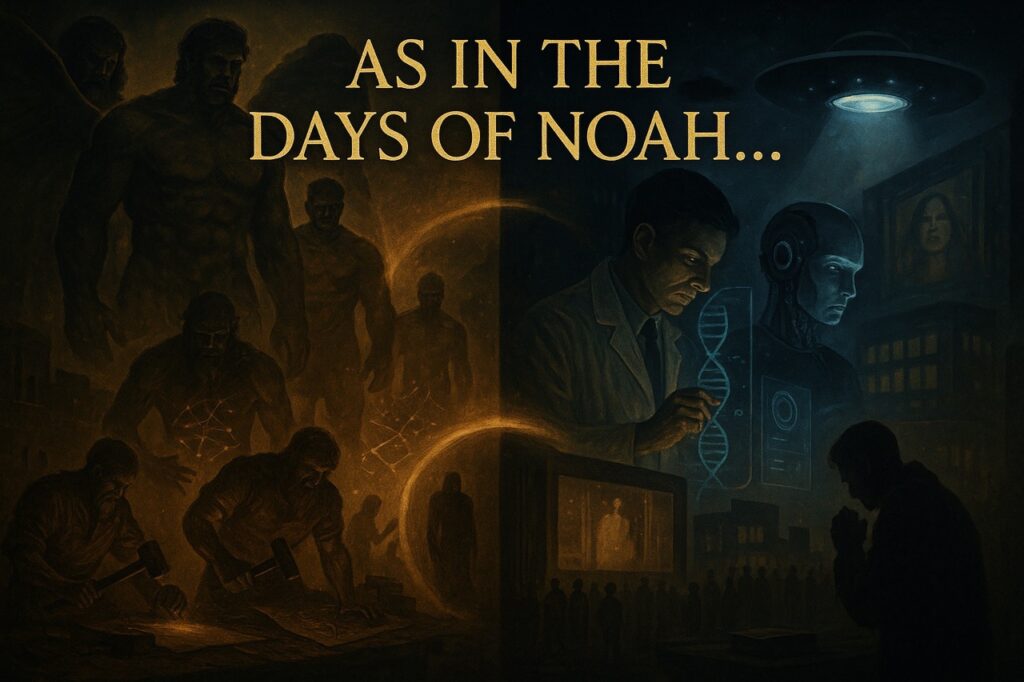
🚨 Modern Parallels & End-Times Interest
In recent years, the Book of Enoch has experienced a dramatic resurgence — especially among Bible prophecy scholars, watchmen, and Christians exploring end-times deception, ancient technology, and spiritual warfare. Why? Because the themes in Enoch — forbidden knowledge, fallen angels, hybrid beings — increasingly mirror the challenges of our modern world.
🧠 1. Forbidden Knowledge Repeating Genesis 6
In 1 Enoch, the Watchers — fallen angels — descend to earth and corrupt mankind by teaching things humans were never meant to know: weapon-making, enchantments, astrology, cosmetics, and root-cutting (linked to pharmakeia).
Today, many see disturbing modern parallels:
- AI and artificial consciousness
- CRISPR genetic editing and transhumanist gene splicing
- Neural implants and brain-machine interfaces
- Global pharmakeia (manipulative spiritual pharmaceutics)
Just as the Watchers overstepped divine boundaries, many believe modern humanity is doing the same — resurrecting the sins of Genesis 6 with technological precision.
🛸 2. UAPs, Alien Disclosure & the Watchers Deception
With mainstream governments now acknowledging UAPs (Unidentified Aerial Phenomena), some researchers suggest these aren’t alien visitors… but spiritual entities — the Watchers, their disembodied offspring, or deceptive manifestations tied to Satanic technologies.
- Are UFOs modern Nephilim transport?
- Are “aliens” actually ancient fallen angels in disguise?
- Does Enoch explain the spiritual source behind advanced flight and phenomena?
Enoch’s descriptions of heavenly beings, dimensional travel, and celestial prisons provide a spiritual framework for interpreting modern supernatural activity.
🧬 3. The Nephilim Theory — Hybrid Offspring and Hidden Bloodlines
Some believe the Nephilim survived the Flood — either through genetic corruption, spiritual reproduction, or a second incursion. This theory posits that:
- Nephilim bloodlines may influence rulers, regimes, or secret elites
- Hybrid beings may return in the end times
- Modern giants or spiritual hybrids echo Enoch’s prophecies
In Enoch’s world, giants brought violence, confusion, and destruction. The idea that these beings — or their spirits — still move among us continues to shape spiritual warfare teachings and eschatology.
⚠️ Why It All Feels So Relevant
“As it was in the days of Noah…” (Matthew 24:37)
Jesus warned that the conditions before His return would mirror those of Noah’s time — the very era the Book of Enoch explores in depth.
In a world obsessed with ancient aliens, secret tech, hybrid creatures, and god-like power, the warnings of Enoch feel less like myth… and more like prophecy.
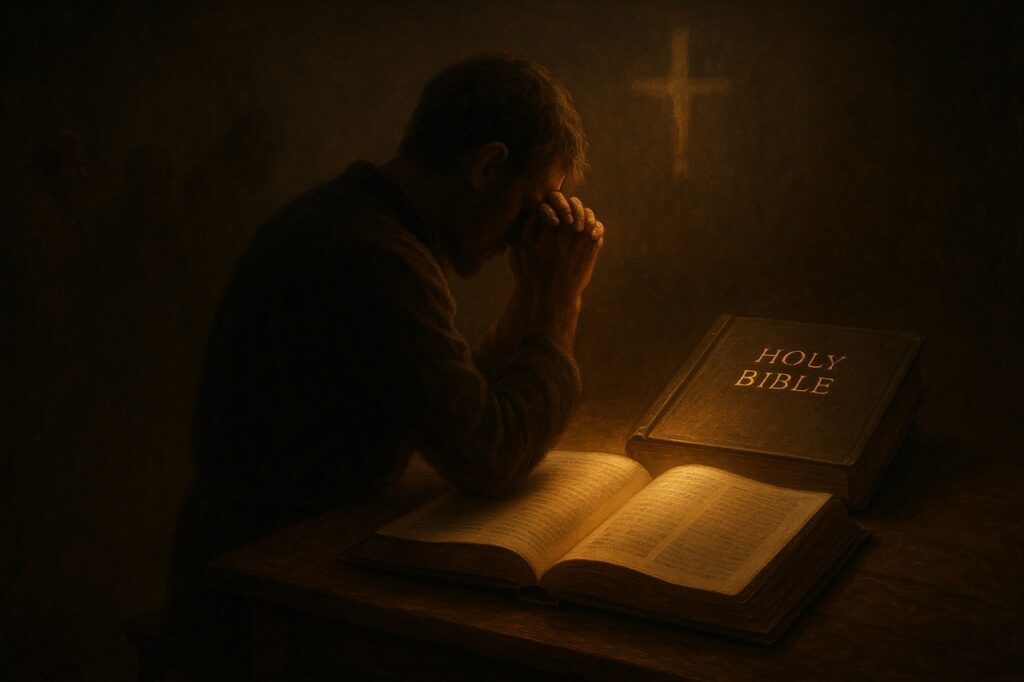
🧭 Reflection & Discernment: Should Christians Read the Book of Enoch?
The short answer?
Yes — with wisdom, caution, and biblical grounding.
While the Book of Enoch is not part of the biblical canon, and should never be treated as equal to Scripture, it remains a powerful historical and theological document. It was respected by many early Jewish and Christian thinkers — and even quoted directly in the New Testament (Jude 1:14–15).
📖 What Makes Enoch Worth Reading?
- It offers ancient Jewish insights into spiritual warfare, divine judgment, and the corruption of creation
- It helps explain obscure Bible passages, especially in Genesis 6, 2 Peter, Jude, and Revelation
- It reflects themes Jesus Himself warned about: “As it was in the days of Noah, so will it be at the coming of the Son of Man.” – Matthew 24:37
By helping us understand the Days of Noah, the Book of Enoch can provide context for end-times deception, the rise of false wonders, and the return of ancient spiritual patterns in modern form.
⚖️ How to Approach Enoch Safely
- 🛡️ Use it as a secondary source, never as a doctrinal foundation
- 📖 Compare everything to Scripture — the true measuring rod (2 Timothy 3:16–17)
- 🙏 Pray for discernment and let the Holy Spirit guide your understanding
- 📚 Study it alongside trusted commentaries and biblical scholars — especially on topics like the Watchers, Nephilim, and apocalyptic prophecy
Read it like a scroll recovered from a battlefield — one that survived an ancient spiritual war to reach our time.
Not as a replacement for God’s Word… but as a lens that sharpens your vision for the battles ahead.
📚 Continue Exploring the Genesis 6 Files:
If this article challenged your view of angels, rebellion, and the ancient world… don’t stop here.
- 🌀 Who Were the Nephilim?
Discover the hybrid giants born of divine rebellion — and why their presence altered the course of human history. - 🧬 Sons of God and Daughters of Men
A deep dive into Genesis 6:1–4: Were the “sons of God” really angels? And what was the sin that triggered divine judgment? - 🌊 Genesis 6 Explained: Corruption, Giants, and the Flood
Unpack the full chapter with Hebrew word studies, moral decay, and the call of Noah in a world gone mad. - 🔥 Moloch Worship and Its Modern Parallels
Was the worship of false gods part of the Watchers’ corruption? This article draws disturbing parallels between ancient child sacrifice and today’s culture. - 🛸 Ezekiel’s Wheel and UAPs: Are They Connected?
Could the “fiery wheels” of heaven be part of the same cosmic framework the Watchers once violated?
Study Tools & Resources
If you want to explore the Book of Enoch for yourself, here are trustworthy resources for study:
- 🔗 Read 1 Enoch – Sacred Texts Archive
Free full-text version of R.H. Charles’s 1912 translation with notes and introduction. - 🔗 Jude 1 Commentary – Blue Letter Bible
Explore the context and Greek analysis of Jude’s reference to Enoch. - 📚 Recommended Print Editions:
- The Book of Enoch by R.H. Charles (classic edition)
- The Book of Enoch: The Prophet by Joseph B. Lumpkin (modernized English)
- Reversing Hermon by Dr. Michael Heiser (deep dive into the impact of Enoch on theology and Jesus)
📖 General Questions About the Book of Enoch
Q: Is the Book of Enoch in the Bible?
A: The Book of Enoch is not included in the traditional Jewish or Christian biblical canon. However, it is part of the official canon of the Ethiopian Orthodox Church, where it has been preserved in the Ge’ez language for over a thousand years.
Q: Why was the Book of Enoch removed or banned from the Bible?
A: The Book of Enoch was not officially “removed,” but rather never canonized in most traditions due to several factors: uncertain authorship, lack of apostolic endorsement, and controversial content on angels and cosmology. Church leaders during the formation of the biblical canon favored texts with clear apostolic ties and theological clarity centered on Christ.
Q: When was the Book of Enoch written?
A: Most scholars date its composition between 300 BC and 100 AD, during the Second Temple period. It was written in multiple stages, reflecting ancient Jewish apocalyptic beliefs and oral traditions attributed to Enoch.
Q: What language was the Book of Enoch originally written in?
A: The earliest fragments were written in Aramaic, discovered among the Dead Sea Scrolls. Later translations exist in Greek and Ge’ez, the latter being the only complete version surviving today.
👁️ Content & Theology of the Book of Enoch
Q: What is the Book of Enoch about?
A: The Book of Enoch describes a heavenly rebellion, the corruption of earth by fallen angels (Watchers), the birth of the Nephilim, visions of God’s judgment, and prophecies of a coming Messiah referred to as the “Son of Man.” It blends apocalyptic imagery, spiritual warfare, and moral warnings.
Q: Who are the Watchers in the Book of Enoch?
A: The Watchers are a group of 200 fallen angels who descended to earth, took human women as wives, and taught forbidden knowledge (such as sorcery, weaponry, astrology). Their offspring were the Nephilim, hybrid giants who corrupted the world.
Q: What does the Book of Enoch say about the Nephilim?
A: The Nephilim are described as giants, the violent offspring of angels and humans. Their presence on earth led to extreme bloodshed, prompting God’s judgment through the Flood.
Q: What does the Book of Enoch say about the end times?
A: It prophesies the coming of a divine judge — the Son of Man — who will bring final judgment, destroy wicked spirits, cast rebellious angels into the abyss, and establish eternal peace for the righteous.
Q: Does the Book of Enoch mention Jesus Christ?
A: Not by name. However, it repeatedly references a Messianic figure called the Son of Man who will judge the nations — a title Jesus uses for Himself in the New Testament.
📜 Canon, Credibility & Controversy
Q: Is the Book of Enoch a pseudepigraphal text?
A: Yes. It claims authorship by Enoch (Genesis 5:24), but scholars recognize it as pseudepigraphal — written by unknown Jewish authors under Enoch’s name to preserve oral traditions and spiritual teachings.
Q: Is the Book of Enoch reliable or inspired?
A: It is not considered inspired Scripture by most Christian denominations, but it’s highly valued for historical and theological insight. Early Church fathers like Tertullian and Irenaeus referenced it positively.
Q: Why did Jude quote the Book of Enoch if it’s not in the Bible?
A: Jude 1:14–15 directly quotes Enoch, showing that early Christians were familiar with the text and considered it spiritually significant. This doesn’t imply full canonicity but acknowledges its influence in Jewish-Christian thought.
📚 How to Read & Apply the Book of Enoch
Q: Should Christians read the Book of Enoch today?
A: Yes — with discernment. While it should never replace the Bible, the Book of Enoch offers rich context for understanding Genesis 6, spiritual warfare, apocalyptic prophecy, and biblical references to fallen angels.
Q: Is the Book of Enoch dangerous or heretical?
A: Not necessarily. Its contents are speculative and symbolic, and some theologies found in it (e.g., cosmic calendars or angelic hierarchies) differ from core Christian doctrine. It’s best read alongside the Bible and with theological care.
Q: Is the Book of Enoch referenced in Revelation?
A: While not directly cited, many concepts — including the abyss, judgment of angels, resurrection of the dead, and divine books of record — appear in both Revelation and 1 Enoch, suggesting a shared prophetic worldview.
🔥 Modern Connections & Prophetic Curiosity
Q: Why is the Book of Enoch gaining popularity today?
A: Many Christians and researchers see connections between Enoch’s prophecies and modern events: AI, genetic manipulation (CRISPR), transhumanism, and UAP sightings. Its themes of spiritual rebellion and forbidden knowledge resonate with growing concerns about deception in the last days.
Q: Are the Watchers connected to modern UFO phenomena?
A: Some theorists propose that today’s UFOs or UAPs are not aliens but spiritual entities — possibly Watchers or fallen angels — using technology or deception to mislead humanity, echoing the corruption described in Enoch.
Q: Are the Nephilim still alive today?
A: While speculative, some believe that remnants of the Nephilim bloodline survived the Flood and appear in later biblical texts (e.g., giants in Canaan). Others see symbolic connections to global elites, tyrants, or hybridization theories in prophecy circles.
